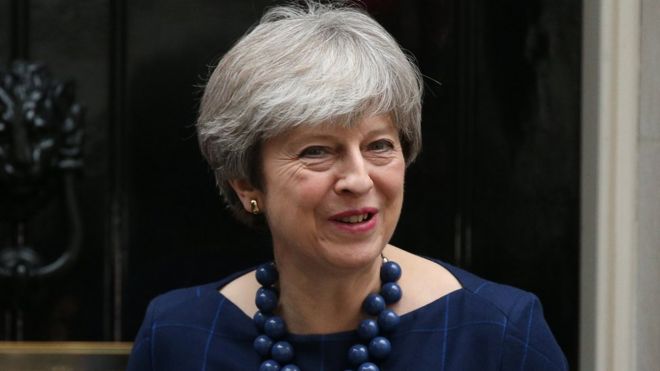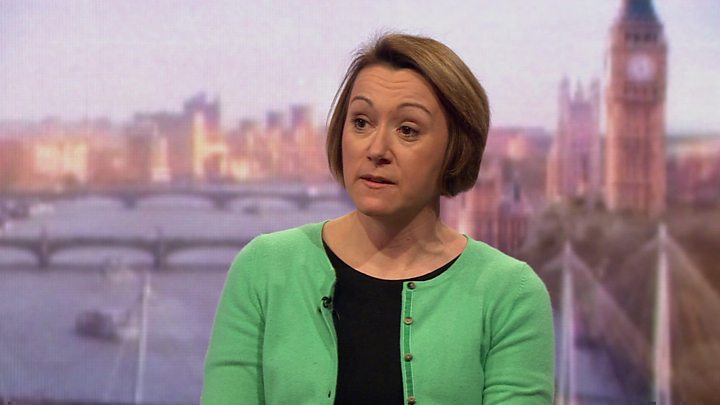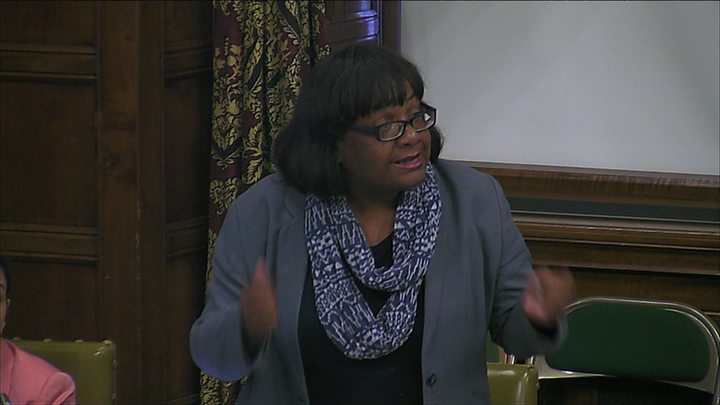
The prime minister is set to announce a crackdown on the intimidation of political candidates, 100 years after some women got the vote.
Theresa May will make an appeal for "tolerance and respect" and say it is unacceptable for anyone to face threats over their political view.
She will consider a new offence to protect politicians and their families.
A report previously found women, ethnic minority and gay candidates were most likely to be targets of abuse.
The move follows a week in which Tory MP Jacob Rees-Mogg was caught up in a scuffle at a Bristol university and Labour Haringey council leader Claire Kober quit over claims of sexism and bullying by party supporters.

Claire Kober accuses Labour of sexism and bullying
Ms Kober told the BBC's Andrew Marr she does not blame individuals, but pointed to a "particular political toxic culture" across the whole country.
In a speech marking the centenary of women getting the vote, Mrs May will pay tribute to those who braved "open hostility and abuse".
The Representation of the People Act, passed on 6 February 1918, gave the vote to women over the age of 30 and "of property".
But 100 years on, the prime minister will say political discussion is becoming harder to have without resulting in "tribalism and rancour".
While British democracy is "robust and oppositional", Mrs May will say a line has been crossed when disagreement turns to intimidation.
Lord Bew, who chairs the Committee on Standards in Public Life, has previously warned the level of personal abuse had reached a "tipping point" and could deter people from running for office.
'I want to see your head swinging'
"The abuse I receive personally tends to come from the hard right of politics," said Labour MP Cat Smith.
"The organised groups tend to be Britain First, the EDL, who are very threatening," she said.
One comment she received read: "I want to see your head swinging from Tower Bridge."
Ms Smith said there was "absolutely no doubt" female MPs received more abuse - particularly those from black and ethnic minority backgrounds.
She wrote letter to Conservative Party chairman Sir Patrick McLoughlin, accusing the party of "propagating personal attacks, smears and untruths".
"Some of the very personal attacks bordered on the racist," she told the BBC. "It almost gives people permission, who are racist online, to take that a step further."
Mrs May will also highlight exploitation of social media and the option to be anonymous.
"It is time we asked ourselves seriously whether we really want it to be like this. Whether we are prepared to accept a permanent coarsening and toxifying of our public debate or whether, together, we will take a stand for decency, tolerance and respect," Mrs May will add.
Among those to reveal the abuse experienced on a daily basis, has been shadow home secretary Dianne Abbott.
Using strong and graphic language, she told a Westminster Hall debate about the torrent of "mindless" abuse - including death threats - that she and her staff receive, which had been "turbo charged" by the speed and anonymity of social media.

Diane Abbott describes 'racist, sexist' abuse
In her speech, the prime minister will announce that from May 2019 candidates in local elections will no longer be forced to publish their address on ballot papers.
This would offer them the same protection as UK parliamentary candidates, who are not required to state where they live.
Mrs May will also cite examples where certain individuals and their families had been targeted at home.
A Labour spokesman said the party condemns personal attacks and that leader Jeremy Corbyn never engages in them.
"Words have consequences and we all have a responsibility to ensure the political language we use does not incite hatred."
Source: BBCNews

No comments:
Post a Comment
Add a Comment...